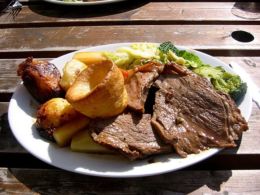In Defense of English Cooking
Posted By Tom C. On In North American New Right | Comments DisabledJordan Peterson was asked by journalist Camilla Tominey about his views on multiculturalism during a recent exclusive interview with GB News, Britain’s nominally Right-leaning news station. In a refreshingly scathing tirade, the Canadian public intellectual branded the idea of mixing incongruous population groups together as “a miracle of stupidity,” correctly making the link between diversity of cultures and the potential within multicultural societies for civil conflict. Predictably for him, given his positioning on the establishment-approved center-Right, he eschewed ever mentioning race and its interrelationship with culture as a determining factor of that stupidity, preferring instead to emphasize the importance of assimilation into a dominant culture over cultural pluralism.
Jordan Peterson uses the restaurant argument in praise of multiculturalism, citing a trip to a comparatively less diverse London in the 1980s during which he was served tinned spaghetti. pic.twitter.com/999sZ7pVZt [2]
— Wyndham 🏴 (@WyndhamVortex) November 5, 2023 [3]
In a particularly funny part of the interview, Peterson, in his typical habit of steelmanning his opponents’ viewpoints, resorted ill-advisedly to the oft-derided “restaurant argument,” citing “diversity of cuisines” as a putative benefit of the mass import of foreign peoples into Western societies. Given that this is a man who, for the purposes of keeping a myriad of self-diagnosed and likely imaginary ailments at bay, purports to subsist entirely on a diet of steak, I, along with many other users of Twitter/X, where the clip of him went viral [4], found this all rather amusing.
Peterson then reflected upon a trip he had taken to a comparatively less diverse London in the 1980s, during which time he claims to have been served “canned spaghetti” in a “reasonably good restaurant” — something my own mother, who grew up during the ‘80s on the St. Luke’s estate right in the beating heart of the city, refutes as either a flat-out lie or, in all likelihood, a confabulation of a mind addled by an oppressively dreary all-meat diet and a past reliance on benzodiazepines. Unless, of course, he, the Alberta yokel that he is at heart, wandered obliviously into a greasy spoon and mistook it for some sort of fine-dining establishment, it’s highly unlikely that even the world-weariest of cooks would’ve served, of all things, tinned spaghetti. When Peterson said that calling the food in the pre-Blairite and still relatively homogeneous England “dismal” would be a “compliment,” I, an inveterate lover of traditional English culture and cuisine, couldn’t help but chafe against the blithe assertions of this increasingly unhinged Canadian rube. Even if some of the wider points he made about the negatives of multiculturalism were a boon to our side, the mere fact that he dropped his moral standards low enough to denigrate English cooking in as facile a manner as your average low-brow American TikToker, is itself worthy of ridicule.
 [5]
[5]You can buy Jonathan Bowden’s Extremists: Studies in Metapolitics here [6].
Despite the grey image of boiled meat and potatoes and the grim, utilitarian post-war attitude the English are perceived to have towards food, English cooking is, I would argue, among the best on Earth when prepared correctly and with the reverence it deserves. From the traditional to the nouvelle, English cooking is characterized by its simplicity, its austerity, and its elegance, celebrating, above all else the quality and seasonality of ingredients both fresh and artisanal. George Orwell, in his essay “In Defence of English Cooking [7],” references the superiority of English cheeses, particularly Stilton, a delectable blue cheese produced in Leicestershire, and Wensleydale, a crumbly Yorkshire cheese (saved from extinction by the popularity of Wallace and Gromit), the wonderful soft sensation of a fresh-baked English cottage loaf, and the juiciness of English Cox’s apples.
The famous proponent of “nose-to-tail dining,” Fergus Henderson, proprietor of the legendary St. John restaurant in London’s meat-packing district of Smithfield, has done perhaps more than anyone in the last two decades to revive England’s culinary reputation. His focus on old-school English country cooking which makes use of local, seasonal produce and every part of the animal, from tails to trotters, is deeply reactionary in its unapologetic traditionalism and steadfast refusal to synthesize influences from the myriad other cuisines imported into England over the last 70 years or so. His iconic roasted ox heart with traditional green sauce was popularized by the late celebrity chef, Anthony Bourdain, and epitomizes his ethos of radical English simplicity. It also hearkens back to an era in which the English were known throughout Europe as master roasters of meats, hence the French appellation of les rosbifs, immortalized in Hogarth’s “O the Roast Beef of Old England,” which depicts scrawny French soldiers transporting a great hulking side of British beef to the English inn in Calais.
Gloriously hearty meat pies made with hot water crust pastries have always been a popular repast among English working, middle, and upper classes alike. A great egalitarian leveler, the humble pie has the ability to transport virtually every Englishman, from Berwick to Bermondsey, back to a halcyon period in his childhood. Pie, mash, and liquor (parsley sauce), a quintessential dish of the now sadly diminishing indigenous East End of London, is a veritable health platter fit for a Pearly King [8] and remains a personal favorite of my kin and I who’ve retreated to the surrounding home counties of Essex and Kent. Cockney traditions remain alive there in spite of the encroaching enrichment and London multicultural overspill which, again, threaten to push this once-celebrated but now disprivileged urban culture further into England’s deepest rural recesses.
England, as the anti-Brexit forces in their smug complacency found out to their dismay back in 2016, isn’t multicultural London, with its smorgasbord of foreign cuisines and cosmopolitan biomass of humanity. In provincial market towns with names such as Bicester, Biggleswade, and Bishop’s Stortford, an older, whiter England lives on, the dominant culture of which is still conspicuously Anglo-Saxon. Traditional fayre like shepherd’s pie washed down with good English ale still reigns supreme over the unlovingly served plates of greasy, cornstarch-laden Xi’an-style noodles and unearthly-colored bubble teas hipster-whites pay over the odds for at Spitalfields Market. But even the trendy white-left gentrifiers, in their neurotic quest to seek out the novel and the exotic, revert invariably, as all humans do, to the comforting and the familiar. Recently, during a brief sojourn in the East End, a part of London in which the local Bengali population evinces a perverse nativism towards the influx of well-to-do white gentrifiers from the shires, I was heartened to see a general waning in interest in foreign cuisines and a revival of the old English traditions of pie making, real ale brewing, and the new-fashioned takes on the beloved Sunday Roast.
Food and the dishes that we remember most fondly from childhood are inextricable from who we are as members of ethnic and national tribes. When we yearn for that quintessential taste of home, it’s the food that our ancestors have bequeathed to us, not the dishes that newcomers have brought to our shores, that we crave most. A shared love of home-cooked bangers and mash, that most comforting of indigenous dishes, will transcend the divisions of class and politics among ethnic Britons in a way that fusion Thai burritos and Jamaican curry goat simply will not.
The reason Peterson’s callous dismissal of English cuisine as “dismal” on a national news channel felt like a personal attack is because that it was. Peterson, even in spite of his gestures towards conservatism, remains an old-school liberal at heart. His inability to recognize the importance of tribe and its core markers of identity, including cuisine, is why his individualist philosophy remains both unsatisfying and undignified. In the unlikely case that the self-proclaimed “professor against political correctness” happens to be reading this, I invite him to have a home-cooked meal at my family home in Deep England where he can have his bigotries and prejudices against English cooking challenged and hopefully changed — that is, if I can convince him to ditch his ridiculous fad diet first.
